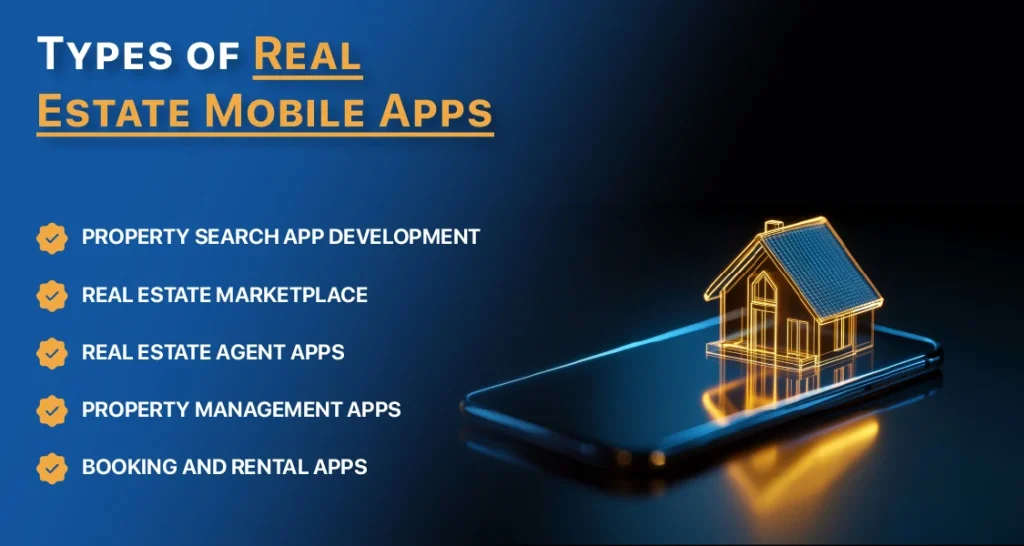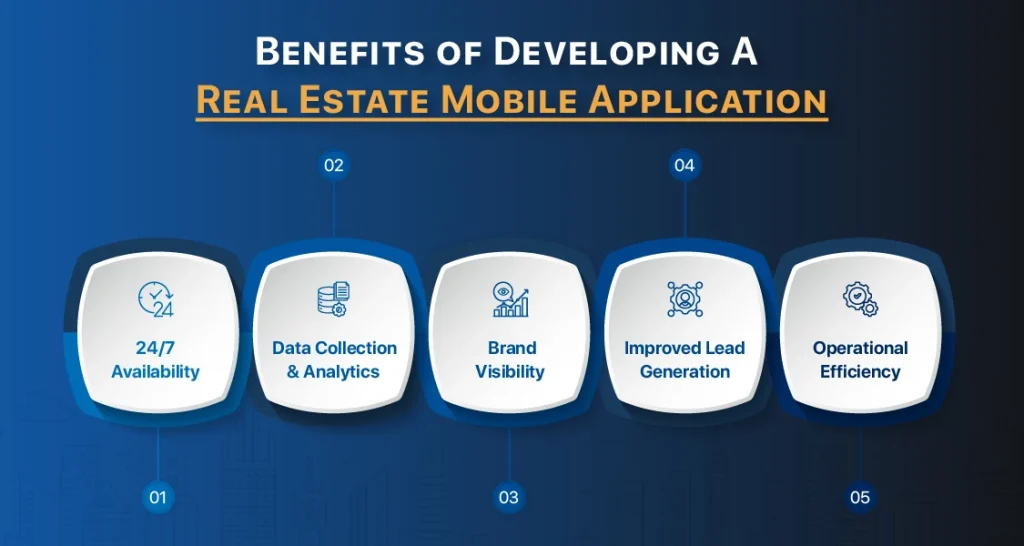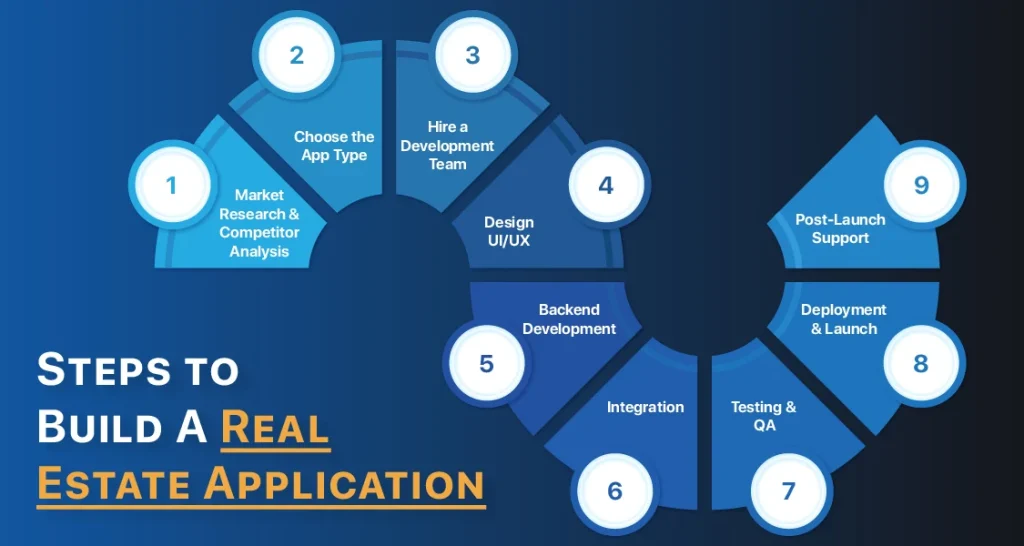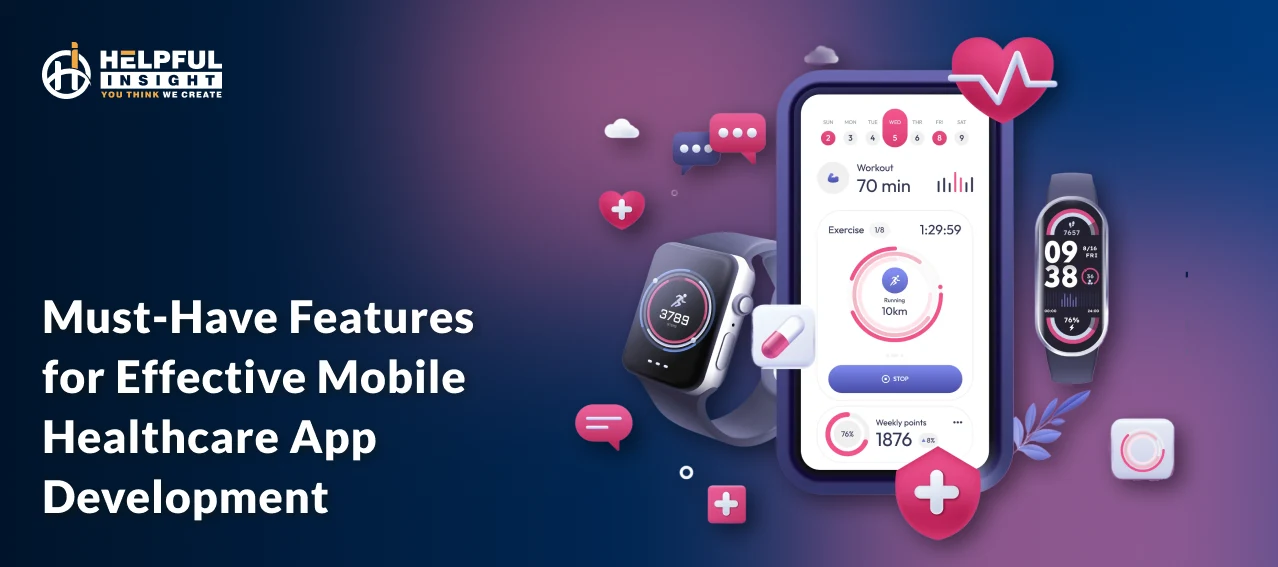The real estate industry is taking new turns with technology. What was previously can be done by the paperwork and personal visit is now possible with few clicks. Wondering how? Mobile apps are the way, boosting ease and speed for both sellers and buyers. But what if you have an idea to create a real estate app that surpasses all the existing apps? If Yes, keep reading this blog that covers all the niches related to real estate app development.
In this blog, we will discuss the cost to build a real estate app, the advantages of investing in this segment, and walk you through the process of creating a high-performing property management app specific to the property market requirements of today.
What Does It Cost to Build A Real Estate App in 2025?
The real estate app development cost is based on multiple factors. These factors are broadly dependent on the app’s features, the development team base location, the platform to be used, and the complexity of the app. For an example real estate app for IOs would be expensive then android version
Key Cost Drivers of Real Estate Application Development Services
1.Features and Functionality: A feature-rich real estate app development services with extensive features such as video tours of properties, 3D walkthroughs, or AI-driven recommendations will be more costly than a basic listing app. Know further in the table below.
2. App Design: A unique and fashionable UI UX design will more cost to build a real estate app. Smaller template-style designs will be cheaper.
3. Development Team’s Location: A U.S. or Western European development team will generally charge more than those in countries such as India, Eastern Europe, or Southeast Asia.
4.Platform: Developing for a single platform (iOS or Android) will be cheaper than developing for both. Cross-platform development frameworks like Flutter or React Native will reduce the cost but may have performance compromises.
5. Backend Development and Integrations: Incorporating third-party services, APIs (like Google Maps for location functionality), payment gateways, and property databases like MLS (Multiple Listing Service) will contribute to the development cost.
Real Estate App Development Cost Breakdown:
MVP (Minimum Viable Product): Even a minimum setup of your app, with the absolute bare essentials such as property listings and searching, will run anywhere from $30,000 to $60,000.
Mid-Range App: An app with user profiles, messaging, and more refined searching filters will range from $60,000 to $120,000.
Advanced App: A real estate development app like Zillow, with strong features such as AI integration, 3D tours, virtual home staging, and advanced backends, can range from $120,000 to $250,000.
Why Should You Invest in Real Estate App Development?
Mobile real estate app development is an investment if planned correctly, coming with several benefits, particularly in the context of the industry’s shift towards mobile-first technology and online media. The reasons being:
1. Increasing Mobile Adoption:
Mobile phones are the leading device used for online communication, with more than 70% of potential buyers starting their purchase online. App-based provides your company with an opportunity to leverage this, as consumers can view properties, connect with agents, and arrange viewings all via phone.
2. Simplified Processes
With real estate web application development one can make complex work easy. Real estate website developers can add homes, answer questions, arrange viewings, and complete paperwork in the app. Real estate buyers and sellers can view listings, get loans, arrange viewings, and make offers on their phones.
3. Improved Customer Experience:
A quick, efficient, and easy-to-use real estate website development will provide a satisfying user experience. Hire real estate app development agencies that can extend features like walking tours by virtual means, and push notifications on new listings or offers will generate high customer satisfaction and participation to a large extent.
4. Revenue Generation
There are a few methods by which you can get profit through house rental app development. With the help of a real estate agency you can integrate paid subscription options for listings, advertisements for relevant services (such as mortgage brokers), in-app purchases for additional features, or charge a commission on transactions carried out via the app.
5. Competitive Advantage:
With the market turning more digital in nature, having a robust and efficient app along with a real estate mobile app development company places you ahead of competition that is working with traditional methods. A real estate app development service tailored to your needs can establish you as a market leader, attracting new-gen buyers and sellers who prefer online platforms for their property requirements.
Types of Real Estate Mobile Apps

Before you start the conversation with real estate app developers, you will need to be clear what kind of app you wish to develop. They all cater to different purposes, and it will influence the functionality and complexity of your app.
1. Property Search App Development:
These are the most popular real estate apps, enabling users to browse, filter, and search for properties listed by agents or owners. Examples of such an app include Zillow. Such apps generally possess features like:
- Search filters (price, place, type of property)
- Photos, descriptions, and property info
- Contact avenues for agents
- Virtual tours and 3D views
- Real Estate Marketplace:
These applications bring the sellers and buyers together directly, and users can post properties and deal with potential customers. It is a two-way market platform whereby the application is the place where one can do transactions.
2. Real Estate Agent Apps:
Real estate agent app development is intended for brokers. Coming with features such as lead capture, organizing client appointments, listing properties, and interacting with clients. Agents can list new properties, monitor views on properties, and remain organized.
3. Property Management Apps:
Suitable for property managers and owners, these apps assist with tenants, rent collection, maintenance requests, and leases.
4. Booking and Rental Apps:
Targeting short-term and long-term rentals, these apps enable users to search for available properties, place bookings, and settle payments. Sites such as Airbnb have redefined how individuals rent homes for temporary stays.
Read Also;- What is The Role of AI in the Real Estate Industry?
Benefits of Developing A Real Estate Mobile Application

A real estate app is not just an online listing; it’s an end-to-end solution for revolutionizing the way people interact with real estate. The benefits are more than just having a digital presence:
1. 24/7 Availability:
Your app allows users to browse property listings, schedule appointments, and communicate with agents 24/7. This round-the-clock functionality increases user interaction and satisfaction.
2. Data Collection and Analytics:
A thoughtful code pushed by a real estate application development company can track user behavior and preferences, giving you valuable information on marketing, app creation, and decision-making.
3. Brand Visibility:
A mobile application can boost your brand’s visibility and credibility. A professionally created, high-quality app lets users know that you’re extending best in class custom real estate app development services. This can outshine you from competitors and build greater trust.
4. Improved Lead Generation:
Real estate apps assist in generating leads through simple-to-fill contact forms, enabling users to book viewings or show interest in properties straight from the app. Lead generation tools built into the app can automate communication and assist in converting prospects into clients.
5. Operational Efficiency
With embedded task management, CRM integration, automated lead tracking, and other back-end solutions, apps streamline much of the routine work in real estate, allowing agents to spend more time on high-leverage activities.
Read Also:- Top 14 Innovative Real Estate Business Models for USA Startups
Must-Have Features in Real Estate Application
A successful real estate app development company will invest its energy into creating an application that has all the main features benefits buyers and sellers. This makes property to be accessed more quickly and makes it simple for all to use.
User-Side Functions
1. Property search with advanced technology: Properties can be sorted on the basis of well-defined parameters such as locality, price range, and type of property. You can see what are the trending apps in the real estate segment to know trends.
2. Interactive Map Integration: It displays the locations of properties on a map to allow users to see the location and nearby amenities. In this feature you can play with a rich user interface as this will add an extra visual twist in the app.
3. Virtual Tours & 3D Viewing: A groundbreaking feature that facilitates remote viewing and tour of properties. This can be a USP if used correctly to get in touch with real estate app developers to know what can be done.
4. Push Notifications: Notifies users of new property listings, price drops, or changes on their favorite properties. This will keep your users informed and engaged leading to wider acceptance of new updates.
5. In-App Chat: Allows users and agents to communicate through live chat to give quick responses. Try to integrate the live chat bots and establish a good support team answering queries without delay.
6. Mortgage Calculator: Assists shoppers in determining how much they can afford by providing calculations for mortgage payments per month. Highlight and market it as a separate tool as this feature holds potential to drive traffic.
Admin/Agent Features:
1. Property Management Dashboard: A dashboard where agents upload and manage listings, view the details of the properties, and monitor performance. Try to keep the interface as simple as possible to avoid frustration in non technical users.
2. Lead & Client Management: Lead tracking tools, appointment, and client interactions. Give popular CRM features like Whatsapp, Calendar, Email, and ad integration.
3. Analytics & Reporting: Provides insights on user behavior, listing performance, and other statistics for business optimization strategy. Providing deep insights can help users for page optimization eventually leading to a better platform.
Read Also;-10+ Best Real Estate Websites for 2025: Innovating the Future of Property Transactions
Steps to Build A Real Estate Application

Developing an app for a real estate development project is a systematic approach. Here’s the Steps cost to Build A Real Estate Application
1. Market Research & Competitor Analysis:
Check all the most downloaded real estate apps. Look for the feature that is the most requested one? What does the user experience on apps like Zillow look like? By viewing the competition, you can develop an app that has a market advantage.
2. Choose the App Type
Determine the core functionality of your app, whether an agent marketplace, property listing, or investment app. We have given the app types in the blog a look and pick what suits you the best.
3. Hire a Development Team:
Choose an experienced real estate app development company that has done similar type of work. They will help you plan the app, design the interface, and perform the development. Don’t forget to check their reviews online.
4. Design UI/UX:
Pay extra effort on making the app user friendly. The app must be visually attractive, easy to use and liable in various screen sizes. It’s a key step to feel free to schedule meetings with the designer as many times as needed.
5. Backend Development:
Backend development is a difficult part because it includes creating databases, managing user information, setting APIs and ensuring safe data exchange between servers and users.
6.Integration:
Third-party service integration such as Google Maps, MLS listing and payment systems should be included to create a real estate app.
7. Testing and QA:
The test is done to verify that the application is expected to work, free from bugs, performance problems or security weaknesses. Trust only the best for this step because once it’s launched there is no scope for failure.
8. Deployment & Launch:
Once testing is complete, deploy the app to the App Store, Google Play, or other distribution channels. Get in touch with us to understand terms and conditions of the store and how to get it done smoothly.
9. Post-Launch Support:
After launch, routine maintenance, patches, and bug fixes must be done so the application works properly and is secure. Look for the companies providing 6 months support at least.
Conclusion
Going for the real estate development app in 2025 is an attractive investment for businesses related to property dealing. With the right features, functionality and Hiring Dedicated developers, your app can meet the market demand and generate long term value. Get in touch with the Helpful insight as they have a team of expert app developers who can help you in the Custom Real Estate App development. Schedule meeting now!
FAQs
Ans. A properly selected tech stack is vital for your app’s performance. It determines how features such as cloud services, API integrations, and data security are handled, making the app run smoothly and efficiently meet user needs.
Ans. Understanding the Cost of creating a real estate application depends upon various factors like technical and economical conditions. This can be anywhere around from $10,000 to $120,000+.
Ans. Usually, 8 -16 weeks for a mid-sized app with typical features. Big and complex apps with AI or multiple user roles might take 4–6 months, particularly if you’re combining third-party services and backend systems.












